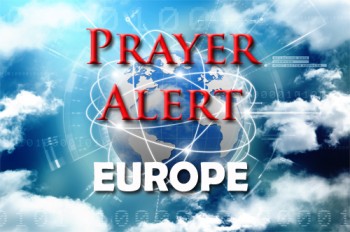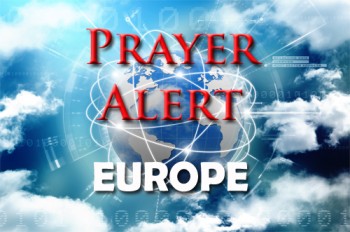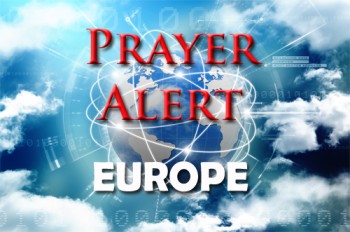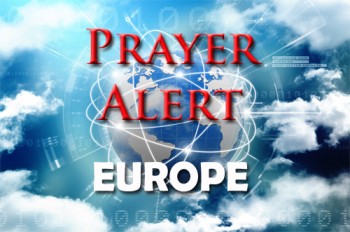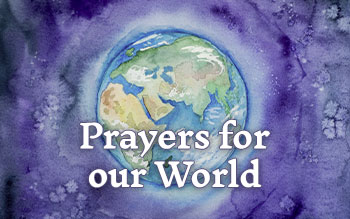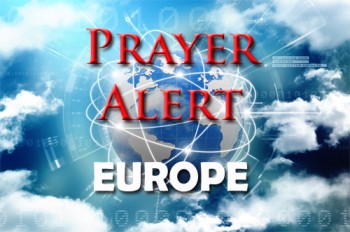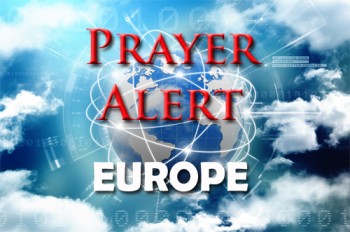Displaying items by tag: Europe
Switzerland: Davos - climate change
The World Economic Forum annual meeting of 3,000 of the world's richest and most powerful people took place this week in Davos. One of the speakers was Greta Thunberg, who opened a debate entitled, ‘How to avert a climate apocalypse’. Attendees were not able to avoid climate change, as the theme was ‘Stakeholders for a Cohesive and Sustainable World.’ Meanwhile let us pray for Canadian residents cleaning-up after a monstrous winter storm that brought thirty inches of snow, causing chaos; for Australians dealing with the aftermath of severe thunderstorms, floods and hail the size of golf balls in different areas, while fire weather warnings cover parts of Western Australia; and for tens of thousands living near the restless Philippines volcano ‘recharging’ with fresh magma and toxic gas. The forum is asking all companies in Davos to commit to net zero carbon emissions by 2050.
Germany: deported asylum-seekers ‘face torture or death’
The leader of the German Evangelical Alliance, Reinhardt Schink, spoke out against the tragedy of Christian refugees and migrants who are sent back to Afghanistan and Iran, even though they could face prison, torture and death. He cited statistics about asylum-seekers who have converted to the Christian faith in Germany, but later been rejected by the authorities. ‘Behind all these nameless figures are devastating personal destinies, and risk us harming our own values system. Authorities should use the “know-how” of the Christian churches.’ He said that experts should engage with church leaders, who guarantee that a person has effectively been baptised, taken a Christianity course, and become an active member of a church community. Schink added, ‘It looks as if pastors are suspected of not telling the truth. We hurt ourselves as a country when precisely those migrants who had integrated well and had become bridge builders between cultures are expelled.’
Ireland: general election
Taoiseach Leo Varadkar has said that Ireland will hold a general election on Saturday 8 February. It is unusual for Ireland to hold elections on a Saturday; they are usually on a Thursday or Friday. As a result of the decision, the Irish parliament - or Dáil - will be dissolved. Varadkar has been leading a minority government for two years since taking over from former Prime Minister Enda Kenny in 2017. Finian McGrath, the Dublin Bay North TD and minister for disability issues, has said he will not seek re-election. But he is far from retiring and will remain involved in political activism. He said, ‘I hope to spend time encouraging some of the 13 percent of Ireland’s population who have some form of disability to get involved in politics at a local or national level.’
Europe: countries redeploy troops
Despite a call by the Iraqi parliament for the withdrawal of its forces, the USA stated it has no plans to do so, even though a draft letter signalling a pull-out was sent to Iraq’s prime minister. Germany has transferred troops to Jordan and Kuwait for security reasons. About fifty British personnel who had been training Iraqi security forces were relocated - either from Baghdad to nearby Taji, or out of Iraq altogether - after they spent a day in a bunker to shield themselves from mortar shells. Twenty military planners have flown in to prepare for different scenarios, ranging from a deepening of the conflict with Iran to a full departure from Iraq. Croatia’s 14 soldiers in Iraq have been moved to Kuwait, and Italian troops moved out of the US base in Baghdad.
Ukraine jet crashes, killing 176
On 8 December, a Ukrainian jet bound for Kiev crashed soon after taking off from Tehran. The majority of passengers were from Iran and Canada. Ukraine initially blamed engine failure, but later retracted the statement. President Zelensky warned against ‘speculation or unchecked theories regarding the catastrophe’ until official reports were ready. As a sign of the potential difficulties facing crash investigators, the head of Iran's civil aviation organisation was quoted as saying that the plane's black box would not be handed over either to Boeing or the Americans. An Iranian official blamed an engine fire, adding, ‘Had the accident happened due to a missile strike, the plane would have exploded in the air’.
Cyprus: rape case
UK foreign secretary Dominic Raab expressed ‘serious concern’ about a possible miscarriage of justice by a Cypriot court convicting a British teenager of lying about being gang-raped on holiday. The 19-year-old originally told police she was raped by twelve Israeli youths. She withdrew her complaint two weeks later, saying she was ‘forced’ to do so by police who left her ‘scared for my life’ and who did not record the interview; it was her word against theirs in court. The alleged attackers have returned home, while she faces jail and a fine. The case raises questions about Cyprus’s treatment of victims of sexual assault. Protesters claim the Cypriot authorities ‘always find a reason not to believe women who claim they have been raped’. The teenager has been contacted by others who were ‘forced to remain silent’ during similar experiences. She will be sentenced on 7 January.
France: Strike deadlock continues over pension reforms
The French government and a key trade union on Sunday exchanged bitter accusations over who was to blame for France’s over three-week transport strike against pension reforms, as the stalemate showed little sign of relenting.
Deputy Transport Minister Jean-Baptiste Djebbari accused the hardline CGT union of a “systematic opposition to any reform” while the union’s chief Philippe Martinez charged the government with strewing “chaos” in the conflict.
The strike—now longer than the notorious 22-day strike of winter 1995 -- has lasted 25 days and is on course to surpass the longest transport strike in France, which lasted for 28 days in 1986 and early 1987.
Aside from two driverless lines, the Paris metro was again almost completely shut down on Sunday while only a fraction of high-speed TGV trains were running.
The government and unions are only due to hold their next talks on January 7, two days ahead of a new day of mass demonstrations against the reform, which is championed by President Emmanuel Macron.
In an interview with the Journal de Dimanche newspaper, Djebbari angrily accused the CGT of “attitudes of intimidation, harassment and even aggression” against railway workers who had opted not to down tools.
He accused the CGT of showing a “systematic opposition to any reform, of blocking and sometimes intimidation”.
“The CGT wants to make its mark through media stunts. But the French are not going to be duped by the extreme-left politicisation of this movement,” he added.
‘Like Thatcher’
But in an interview with the same newspaper, Martinez accused the government of trying to ensure the conflict deteriorated further.
“Emmanuel Macron presents himself as a man of a new world but he is imitating Margaret Thatcher,” he said, referring to the late British prime minister who sought to break the power of the unions in 1980s standoffs.
“There is real anger. Of course, not being paid for 24 days is tough. But the conflict is the result of two-and-a-half years of suffering,” Martinez added.
He said he was awaiting concessions from Macron in a New Year’s address Tuesday evening as well as recognition that “most people are not happy and that he (the president) was wrong”.
The unions are demanding that the government drops a plan to merge 42 existing pension schemes into a single, points-based system. The overhaul would see workers in certain sectors—including the railways—lose early retirement benefits. The government says the pension overhaul is needed to create a fairer system. But workers object to the inclusion of a so-called pivot age of 64 until which people would have to work to earn a full pension—two years beyond the official retirement age.
With thanks to (AFP)
Pray: for talks and conciliation negotiations to be successful.
Pray: that demonstrations and marches will remain peaceful and will not escalate into civil unrest.
Pray: that the growing public anger can be defused quickly - at the highest level.
Pray: that France shall be saved.
Albania: unethical building leaves 5,000 homeless
Illegal construction is rife in Albania: many buildings lack permits and don’t adhere to safety codes. The earthquake on 26 November killed 51 people, injured 900, and left 5,000 homeless. Nine people were suspected for homicide and abuse of power. Seventeen builders, engineers and officials are suspected of breaching building regulations, causing the collapse of buildings during the 6.4-magnitude quake. Eight of the suspects are still being sought by police. Preliminary investigations have established that irregularities had been the cause of buildings collapsing. Albania lies near a tectonic fault line; pray that the vulnerability of the land will be a major consideration when further construction work commences. Pray for a strict review of building regulations, and for the homeless to be rehoused in appropriate accommodation speedily and to be fairly compensated.
Italy’s gospel radio
European Gospel Radio (EGR) is a non-denominational Christian radio touching any country in the world 24/7 on shortwave, streaming and satellite. It is a non-profit organisation, staffed by volunteers and professional broadcasters based in Milan. Since 1988 Christian broadcasters from around the world have trusted EGR to provide a radio link between their radio programmes and listeners globally. They cover Europe, Africa, Asia/Pacific, and the Middle East with daily Bible programmes, Christian news, and information both in English and in regional languages. There are still many places globally and millions of displaced people out of reach of modern communication - FM, AM, TV, satellite, Internet - and even without electricity. However, shortwave radio reaches anywhere.
Greece: ‘Two different hells’
Arash Hampay arrived in Greece in 2016, escaping persecution in Iran and crossing the Aegean Sea from the Turkish coast. After spending 18 months on the island of Lesbos, he now lives in Athens, where he works with homeless asylum-seekers. ‘It is two different hells’, Hampay, now a registered refugee and activist, said, referring to the struggles people face in both places. Greece promised to move 20,000 asylum seekers from overcrowded island reception centres to the mainland by early 2020, following a surge in refugee arrivals this summer. Since October 9,500 asylum-seekers have been moved, sparking anti-refugee protests in affected areas. Meanwhile, some 17,500 people have arrived from Turkey, and overcrowding is now worse on the islands, where 38,800 asylum seekers now reside.
